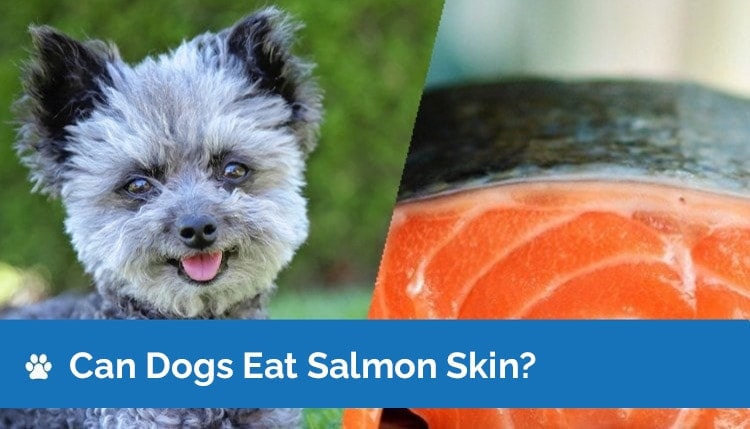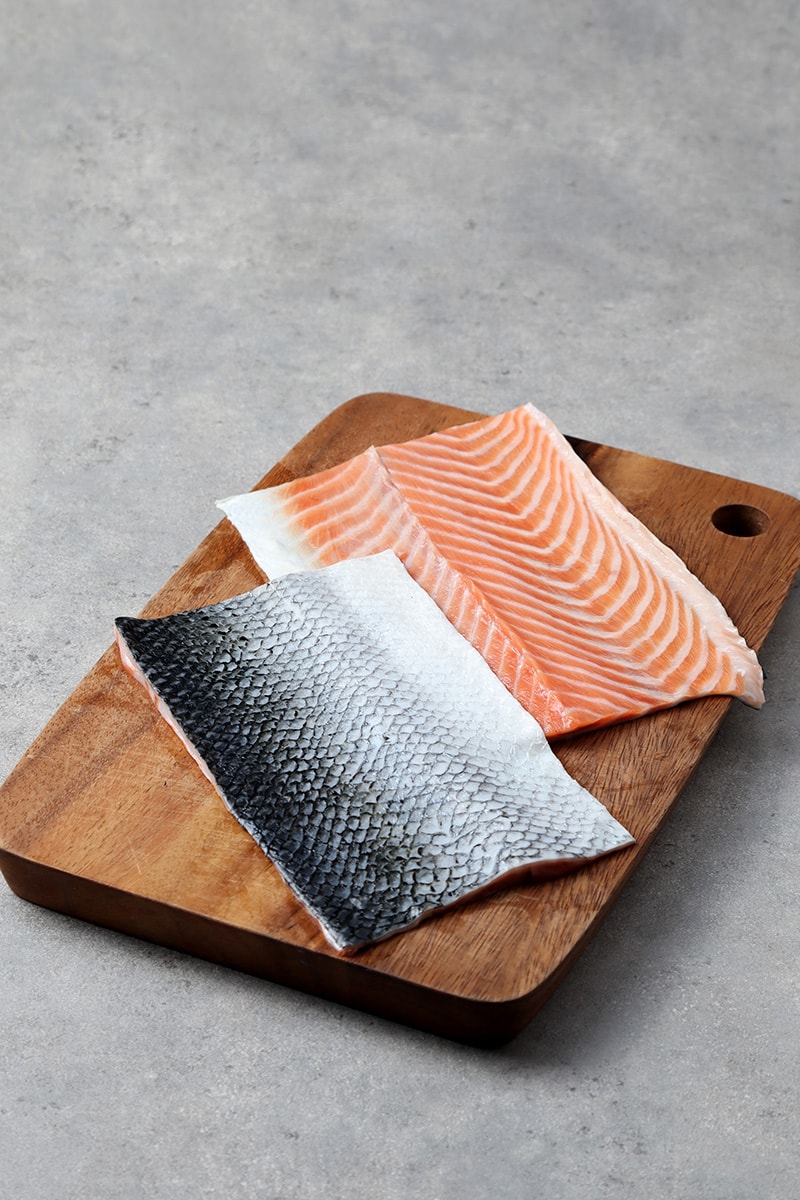If you read dog food labels, you may know that salmon is often used as a protein source, especially in diets with few ingredients. So, you can guess that salmon is safe for dogs to eat. But what about the skin of the fish? Dogs can eat salmon skin as long as it’s cooked right and doesn’t have any harmful ingredients in it.
Find out why salmon skin is good for your dog’s health and find out the answers to some of the most common questions people have about dogs eating salmon by reading on.
Salmon skin is growing in popularity as a healthy treat and supplement for dogs. As pet owners we want to give our furry companions foods that provide nutritional benefits. But is salmon skin safe for dogs to eat? What are the potential risks and rewards? This detailed guide examines whether dogs can eat salmon skin both raw and cooked.
An Overview on Feeding Salmon Skin to Dogs
Salmon skin is the outer layer that covers the flesh of the salmon. It contains a high concentration of healthy fats and nutrients compared to the salmon flesh itself. The skin is usually discarded by humans after filleting salmon. However, it can provide nutritional value for our canine companions.
There are some risks with feeding raw salmon and salmon skin to dogs. Raw salmon may contain parasites that can cause salmon poisoning disease. Thoroughly cooking the salmon can destroy these parasites and make the fish safer. Overall, dogs can eat salmon skin as long as it comes from a trustworthy source and is cooked the right way.
Nutritional Benefits of Salmon Skin for Dogs
Here are some of the biggest health benefits of salmon skin for dogs
-
High in Omega-3 Fatty Acids – Salmon skin contains high amounts of omega-3s, which provide anti-inflammatory effects and support skin/coat health.
-
Source of Protein—Salmon skin has a lot of high-quality protein that helps muscles grow and tissues heal.
-
Vitamin Rich – Salmon skin contains B vitamins, vitamin D, selenium, potassium and other nutrients dogs need.
-
Good for Brain Health: Omega-3s found in salmon skin help dogs’ brains develop and work well.
So by feeding your dog salmon skin, you are providing a nutritious whole-food supplement containing healthy fats, protein, and vitamins. It can be an excellent addition to your dog’s diet.
Can Dogs Eat Raw Salmon Skin?
Raw salmon skin may pose some risks that need to be considered. Raw salmon and salmon skin may contain a parasite called Nanophyetus salmincola. This parasite can cause “salmon poisoning disease” which can be fatal if untreated.
The parasite is destroyed by thoroughly cooking the salmon. So only feed your dog cooked salmon skin, not raw. Also, freeze the salmon for 2 weeks before feeding to kill any parasites.
If your dog accidentally ingests raw salmon skin, monitor them closely for symptoms for salmon poisoning like vomiting, fever, and diarrhea. Seek veterinary treatment right away if these symptoms develop.
Overall it is not recommended to purposely feed dogs raw salmon or the skin because of the parasite risk. Cooked salmon skin is the safer choice.
Is Cooked Salmon Skin Safe for Dogs?
Yes, cooked salmon skin is totally safe and healthy for dogs to eat. Cooking destroys any potential parasites, making it safe for your dog.
Be sure to cook the salmon skin thoroughly until it flakes and is no longer translucent. Grilling, broiling, baking, searing, and pan frying are all great cooking methods.
Avoid adding seasonings like garlic, onions, chives, butter or oil, as these can be toxic to dogs. Plain cooked salmon skin is healthiest.
When serving cooked salmon skin to your dog, it’s best to remove it from the cooked salmon fillet. Then cut or tear it into bite-sized pieces for your dog. Smaller pieces prevent choking.
Monitor your dog closely the first few times to make sure they can digest it well. Introduce new foods slowly.
How Much Salmon Skin Can Dogs Eat?
It’s fine to give your dog cooked salmon skin once or twice a week as a treat. Limit portion sizes to about 1 oz per 10 lbs of your dog’s body weight.
Too much salmon skin can lead to pancreatitis or other issues. It’s very rich and fatty. Overdoing it with fatty foods can cause gastrointestinal upset.
Also rotate salmon skin with other protein sources. Variety is key to a balanced diet. Avoid feeding salmon more than a couple times a week.
For dogs with pancreatitis, inflammatory bowel disease, or other conditions, check with your vet before feeding salmon skin. Your vet may recommend avoiding it.
Can Dogs Eat Smoked Salmon Skin?
Smoked salmon skin is safe for dogs as long as it does not contain any added seasonings. Read the label to be sure.
Some smoked salmon contains onions, garlic, chives, oil, butter and other add-ins that are toxic for dogs. Go with plain smoked salmon with no added flavorings or oils.
Only purchase smoked salmon from a trusted brand. Quality matters when it comes to smoked fish. Poor sanitation standards during processing can lead to contamination with bacteria like Listeria.
Smoked salmon skin should be given occasionally in moderation, just like cooked salmon skin. Too much can lead to gastrointestinal upset.
Salmon Skin Dog Treats
There are some commercial dog treats made with salmon skin, which provides an easier way to give your dog this healthy supplement.
When choosing a salmon skin treat, look for all-natural treats with minimal ingredients. Avoid any with onions, garlic, chives, sugar, preservatives or artificial colors.
Some popular high quality salmon skin treats for dogs include:
- Stewart Pro-Treat Freeze Dried Salmon Skin
- Zuke’s Wild Salmon Skin Dog Treats
- Bones & Chews Salmon & Cod Skin Treats
Check the calorie count and adjust portion sizes accordingly for your dog. It’s easy to overdo it on commercial treats. Follow feeding guidelines on the package.
Is Salmon Skin Good for Dogs? Final Thoughts
Salmon skin is packed with healthy omega-3s, protein, vitamins and minerals. This makes it a nutritious supplement for dogs. However, proper preparation and portion control are key.
Only feed your dog cooked salmon skin, never raw. Raw salmon may contain parasites. Also avoid smoked salmon with toxic seasonings. Check with your vet if your dog has any digestive issues before feeding salmon.
When fed occasionally in moderation, salmon skin can be a safe and healthy treat for dogs to enjoy! It provides nutritional benefits paired with a mouthwatering fishy flavor most dogs love.

Salmon Skin: A Healthy Treat for Your Dog
Salmon contains multiple beneficial nutrients for your dog, especially protein and omega-3 fatty acids. Salmon skin is safe for your dog to eat and contains high amounts of fatty acids. Omega-3 fatty acids help support skin, coat, and joint health in dogs.
Many people don’t like the skin of fish, so giving your dog salmon skin is a great way to get rid of waste. The only catch is that many recipes for cooking salmon have toxic or unhealthy ingredients. If you want to feed your dog salmon skin, don’t use oil, butter, garlic, onion, or onion powder.


How Much Salmon Skin Can Your Dog Eat?
Although it does provide health benefits, salmon skin should be offered in limited amounts. As a rule, treats of any kind should make up about 10% of your dog’s daily calories. Recommended calories are calculated based on your dog’s age, size, and activity level.
Smaller dogs should be offered less salmon skin than larger pups because they need to eat less overall. Most of your dog’s calories should come from a nutritionally balanced diet. You should serve salmon skin as a food topper or treat only.
Can dogs eat salmon skin?
FAQ
Why can’t dogs eat salmon skin?
How much salmon skin can my dog have?
Is fish skin ok for dogs to eat?
Is salmon safe for dogs to eat?
Can dogs eat salmon skin?
While salmon can be excellent for your dog, it is still very fatty. As an outcome, giving your dog a lot of salmon skin can lead to your pet’s painful and potentially fatal condition, recognized as pancreatitis. So while dogs may consume salmon skin you have to keep an eye on the serving size even it’s your pup’s favorite meal in the world.
Is fresh salmon safe to eat?
Yes, salmon is a source of omega 3, the fatty acid is responsible for acting in the prevention of cardiovascular diseases, making the heart strong and healthy. Just be careful to analyze the supplier to make sure it doesn’t have any contamination.
How do you cook salmon skin for dogs?
Brush the leftover skin and meat with melted coconut oil. Put back in oven, and set oven temperature to 200°. Continue to cook the salmon skin for 2-4 hours until skin and any meat becomes stiff and jerky-like. Remove the baked salmon skin for dogs from oven and let cool. Break or cut into bite-size pieces, and vwa-LA!
Can dogs eat salmon?
Salmon and all its bits, including the head, tail, and, of course, skin, can provide your dog with a very reliable source of essential for healthy nutrients. Keep in mind, however, that oil-rich foods such as salmon should not be given excessively to the dog as this can lead to complications and health problems.
